The importance of a National Sovereignty Strategy – Jim Molan
Share the post "The importance of a National Sovereignty Strategy – Jim Molan"

Three months ago, as Australia was emerging from a nightmarish summer of bushfires, the first reports of a mysterious new virus began to trickle out of China.
FILE PHOTO (10 April 2020): A single MH-60 Romeo helicopter (photo digitally altered) conducts a running take during first-of-class flight trials onboard HMAS Adelaide. Photo by Able Seaman Jarrod Mulvahill.
Few anticipated the enormity of the impact that COVID-19 would have on the world.
Economically, socially, and politically, it is proving to be one of the greatest shocks of my lifetime – greater than the oil crisis of the 1970s, the ‘recession we had to have’, the Iraq and Afghan wars, or the Asian Financial Crisis.
In its long-term impact, the true extent of which may not be apparent for years, it has every likelihood of surpassing the Global Financial Crisis, 9/11, or even the fall of the Berlin Wall.
The question we are now facing is what must we prepare for next?
If Australia is to maintain its sovereignty in an even more demanding world, it must embrace widespread reform as it comes out of the COVID-19 crisis.
Medium to longer term reforms must be shaped by an overall strategy.
Because I address medium to longer term reforms, nothing in this paper should be taken as criticism of the Coalition Government’s performance during COVID-19.
The current moment is a crisis for our globalised and integrated world.
It has sharply demonstrated the limitations and vulnerabilities of this global model, which we have vigorously promoted since the 1990s and which has delivered Australia enormous prosperity.
Before the crisis, stress fractures were already showing.
Brexit and the election of Donald Trump in 2016 revealed a simmering popular discontent with the results of globalisation.
But this was not only among those derided as ‘Populists’.
Among policymakers in the United States, talk of ‘decoupling’ from the Chinese economy has grown in recent years, in order to avoid vulnerabilities associated with China securing strangleholds over key global industries through such means as state subsidies and intellectual property theft.
The arrival of COVID-19 has turned these stress fractures into enormous rifts.
Concerns about how nations would act in a global crisis are no longer abstract, they are real.
What they demonstrate is that in a crisis, nations will act in accordance with their own interests.
Thus, in Europe last month, we saw France and Germany denying Italy vital medical supplies and the closure of borders within the Schengen area.
Decades of effort to promote European unity could not withstand the arrival of COVID-19.
China’s behaviour has proven to be even starker: covering up the virus when it first appeared; directing its state-owned enterprises overseas (including in Australia) to harvest crucial medical supplies and ship them back to China; using the cover provided by the global crisis to escalate its aggressive behaviour in the South China Sea and towards Taiwan, Vietnam and Malaysia; dispatching medical supplies and professionals to more than a hundred afflicted nations in order to increase its geostrategic influence; and even threatening economic coercion to deny transparency.
Amazingly, the US even refused to send PPE to Canada.
What value does any so-called ‘special relationship’ have in this environment?
History has proven, and the COVID-19 crisis confirmed, the naivete of the argument that economic interdependence makes conflict between nations less likely.
The free exchange of goods across national borders may have made many richer, but in a crisis, when your nation urgently needs a particular good, and the usual supplier refuses to supply it and instead stockpiles for its own purposes, then you have a problem.
The market is wonderful at providing goods and achieving efficiency under peaceful and predictable circumstances.
But in the world we are entering, the peaceful and predictable international circumstances upon which globalisation depends are going to become rarer.
We therefore need to strike a new balance between market efficiency and national security.
Our pursuit of market efficiency in recent decades has made Australia richer, but it has failed to deliver security.
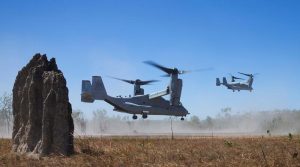
We relied, often without realising it, on the national power of the US for security while the market delivered unprecedented prosperity.
The price we paid was the commitment of small military forces to wars far away.
This was a brilliant strategy under the circumstances at the time, but it now must be seriously reviewed.
COVID-19 has heralded the end of a particular phase of globalisation, and the question becomes how Australia should recalibrate its policy settings to secure sovereignty based on security in the years to come.
We are now acutely aware of the vulnerabilities associated with untrusted globalised supply chains and ‘just-in-time’ logistics.
We must become a resilient nation that is better able to withstand shocks and disruption to the global system.
In the event of a future crisis bigger than COVID-19, we need to ensure that Australia can take care of its own needs in vital areas including food, medicine, energy, IT, fuels, industry, transportation, and defence.
As a nation we need to grow and develop our domestic capacity in these vital areas.
Through doing this, we can ensure that Australia has the resilience it will need to navigate the turbulent waters of the 21st century.
No one advocates turning ourselves into ‘Fortress Australia’, isolating ourselves from the rest of the world and seeking self-sufficiency in every conceivable area: becoming the North Korea of the southern hemisphere.
To do so would inevitably cause a new set of problems.
Australia will remain, to a very large extent, integrated economically with the rest of the world and will benefit from being so.
In the economic sector, private businesses will remain central.
But it is urgent, and overdue for us to correct the excesses of globalisation from recent decades.
COVID-19 has been a big wake-up call.
We need to heed its lessons, to ensure that Australia is prepared in the years to come.
It seems self-evident to most Australians that we need to be more self-reliant without trying to be completely self-sufficient.
Self-reliance reflects how resilient as a nation we must be against internal or external shocks, which allows us to retain a higher degree of sovereignty.
Self-reliance improves resilience, which itself improves sovereignty.
The recent bushfires demonstrate the principle.
Last summer showed that fire prone areas need much more self-reliance than they currently have.
For example, petrol stations in fire prone areas need to have backup generators to pump fuel when power fails.
The same principle applies to nations and the market alone, through its single-minded pursuit of efficiency, will not do it.
The difference between the fires and COVID-19 was that during the fires, only small parts of Australia were shut down and the rest of Australia and the world was available to provide assistance.
For weeks we thought it could get no worse than Black Summer.
Yet because of COVID-19 much of the world has closed down, and for periods we could not draw on external resources at all.
At the moment, many may think it could not get any worse than COVID-19.
If we were told in the middle of last year that a virus would close down the world economy and cost our government $200 to $400m in support payments with 10% unemployed, we might have said that the likelihood of that occurring approached zero, so there was no need to prepare.
But it did occur.
I argue that things could be far worse than local fires followed by a world-wide pandemic which shuts down world economies for a few months, and that we should be as prepared for at least equally probable or improbable events in the future.
If we put ourselves back in the middle of last year looking to predict the future, I submit that the probability of a wide financial crisis or military conflict was far more likely than we ever thought a massive fire then a pandemic would be.
Larger, more damaging scenarios involving financial strife or conflict are now even more likely as a result of COVID-19, not less likely.
It is not my job to provide detailed predictions on what might happen in the medium to longer term in our region or across the world in terms of wider crises, but many others are.
Yet every indicator that I can see is showing an increased probability that a bigger crisis will occur.
We tend to hide these indicators by using polite terms such as cyber attacks, posturing, economic decoupling, rhetoric, stockpiling, weapons procurement, military deployments, espionage, cooperation between allies, harassment, warnings to antagonists, and economic coercion from behind a lack of transparency.
If we had such indicators of the pandemic towards the end of last year (as one particular nation did), we would certainly have reacted and increased our medical self-reliance and resilience (as one particular nation did).
My argument is that we should be planning and preparing now for threats beyond the pandemic.
Before COIVD-19 the rise of four nations (Russia, China, Iran and North Korea) as well as Islamic extremism, and the real demise of US military power since the end of the Cold War, has changed the balance of power in our region and brings uncertainty that we have not experienced for 75 years.
The reliance on the US that we have enjoyed since 1945 remains critically important and we must maintain our alliance.
But an overdependence on the US is as dangerous for our future as an over reliance on globalisation was for a pandemic.
Because the US has a mandated National Security Strategy which cascades down into most areas of American society – economic, military, industrial, technological – the US at least knows when it is succeeding or failing.
And it is failing now in relation to the strategic environment in the Indo-Pacific.
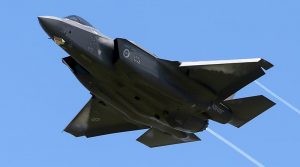
Because the US has a National Defence Strategy flowing from the overarching National Security Strategy, they can say, as the US military commander in the Indo Pacific is publicly saying, that he cannot achieve his National Defence Strategy.
He makes it plain that he does not have the resources to deter Chinese aggression in all its varied forms in our region: the most important challenge of the 21st Century.
Last July, before COVID, the head of the US military called China “the main challenge to the U.S. national security over the next 50-100 years”, and their Defense Secretary described the Indo-Pacific as America’s “priority theater”.
For Australia, it is not only a “priority theater”, it is our home.
Because the US has a national security strategy, and because the US understands that security is far wider than just the military and is actually the basis of national sovereignty, they know what they want to achieve, when they are or are not achieving it, and they have a Congress with real oversight of these issues.
Australia does not have such a mechanism.
We have no overarching national security strategy, or as some people prefer to call it, a national sovereignty strategy.
We have no medium or longer term strategy to position all elements of our nation for an uncertain future.
We are brilliant at handling crises, as our government is currently handling COVID-19.
But we cannot tell if we are achieving or failing on the bigger issues because we are a strategy-free nation.
Given the uncertainty of the new era, we must increase our self-reliance or we will lose our sovereignty.
The mechanism to do this must start with a national security or a national sovereignty strategy.
.
.
Senator Jim Molan – Biography
- Parliamentary service
-
- Declared elected 22.12.2017 as a Senator for New South Wales by the High Court of Australia, vice F Nash (disqualified under section 44 of the Constitution). Defeated at general elections 2019. Chosen by the Parliament of New South Wales on 14.11.2019 under section 15 of the Constitution to represent that State in the Senate, vice Hon. A Sinodinos (resigned).
- Committee service
-
- Senate Standing: Senators’ Interests from 5.2.2018 to 30.6.2019.
- Senate Select: Political Influence of Donations from 5.2.2018 to 6.6.2018; Stillbirth Research and Education from 28.3.2018 to 4.12.2018 (Deputy Chair from 6.4.2018 to 4.12.2018); Autism from 28.11.2019; Foreign Interference through Social Media from 5.12.2019 (Deputy Chair from 10.12.2019).
- Senate Legislative and General Purpose Standing: Education and Employment: Legislation from 5.2.2018 to 3.4.2019; Legal and Constitutional Affairs: Legislation from 5.2.2018 to 30.6.2019 (Chair from 10.10.2018 to 22.10.2018); Education and Employment: References from 5.2.2018 to 30.6.2019; Legal and Constitutional Affairs: References from 5.2.2018 to 30.6.2019.
- Joint Statutory: Intelligence and Security from 12.9.2018 to 30.6.2019.
- Joint Standing: Foreign Affairs, Defence and Trade from 5.2.2018 to 30.6.2019; Migration from 5.2.2018 to 30.6.2019; Foreign Affairs, Defence and Trade from 28.11.2019.
- Personal
-
- Born 11.4.1950, East Melbourne, Australia
- Married
- Qualifications and occupation before entering Federal Parliament
-
- Graduate.
- BA (University of New South Wales).
- BEc (University of Queensland).
- Defence and Security Commentator.
- Consultant on Defence issues.
- Director, National Aerial Firefighting Centre.
- Co-author, Operation Sovereign Borders, 2013.
- Prime Minister’s Special Envoy, Operation Sovereign Borders from 2013 to 2014.
- Special Adviser to the Defence Minister, 2014.
- Military Service
-
- Major-General.
- Defence Materiel Advocate.
- Adviser, Vice Chief of the Defence Force on Joint Warfighting.
- Commander, Australian Defence Colleges.
- Officer, Australian Army.
- Chief of Operations, Coalition Forces, Iraq.
- Honours
-
- Member of the Order of Australia.
- Officer of the Order of Australia.
- Publications
-
- Running the War in Iraq HarperCollins Sydney 2008.
.
.
.
.
.
.

.
.
Share the post "The importance of a National Sovereignty Strategy – Jim Molan"

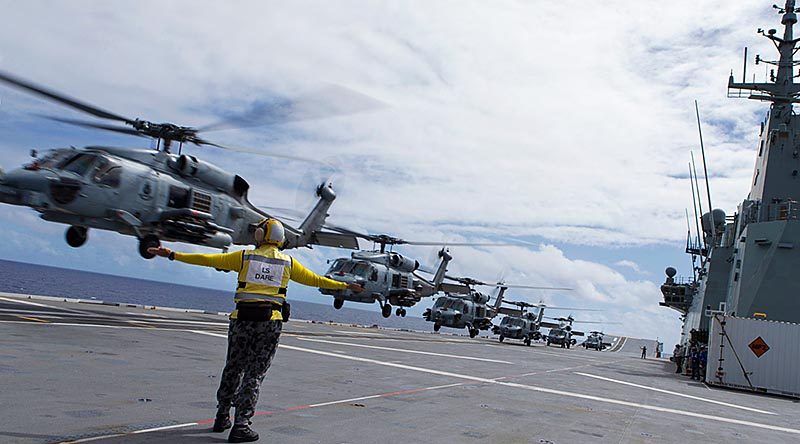

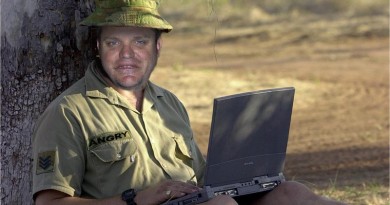
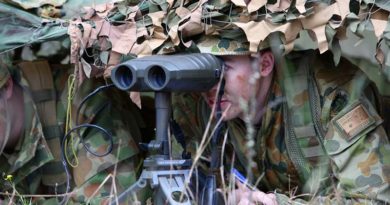
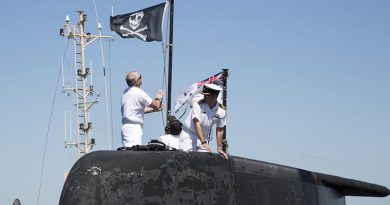
“The question we are now facing is what must we prepare for next?”
I submit that this is not the correct question; the correct question is where are we most vulnerable?
My answer is DIESEL! Being an old Cavalry Soldier I have suffered under the inexperience of many well educated and well decorated careerists of junior and senior rank, who do not possess common sense.
Without DIESEL farm equipment(tractors, harvesters, cattle & grain trucks) do not move; ergo no food. Transport trucks and trains do not move, therefore shops are empty. Mining equipment do not move, thus no export dollars and no coal for electricity. Fire trucks and ambulances do not move, more death and destruction. Military equipment does not move, result ADF staff generating more $@#%. We need to make our own DIESEL OR BIO-DIESEL.
Secondly, we are an island nation with a small population. We must trade. Sea Mines in our harbours or direct shipping lanes will cripple our economy and cause even more trouble than any virus. We need the unsexy mine hunters and clearers. We need a stronger merchant navy.
Thirdly, we need to adhere to the very old military principle (as a nation); MAINTAIN A RESERVE.
What we need is a centralised organisation (not privately run) that lists what we can buy as completely Australian made. For example, if you buy meat then I’ve found a place called ourcow.com.au that provides Australian meat directly to the consumer from Australian farmers. It’s a little more expensive – but I can afford that so I will. I have absolutely no affiliation with them by the way.
There are plenty more. I’m looking for bunk beds for our home. I could buy the $450 one that will do the job and is from overseas. But for $750 I can buy a completely Victorian Ash hardwood model, made in Australia (Victoria) without any MDF, chipboard or glues… I can afford that, so again I will buy it.
It’s these little things that keep Australian manufacturing happening. Same with hand sanitizer – a lot of Australian businesses have switched to producing this all locally and by an Australian business. I’ll search for that from now on and buy that instead.
But – it would be so much easier if there was a site that pretty much listed everything. The “Made in Australia” symbol seems to have too many ways you can manipulate it.
If every Australian just did this in some way, we’d be boosting our manufacturing and agriculture sectors up – and probably getting better quality for it.